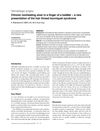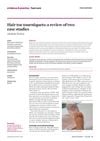 2 citations,
August 2014 in “Archivos argentinos de pediatría”
2 citations,
August 2014 in “Archivos argentinos de pediatría” A 6-year-old girl with Turner syndrome also had psoriasis, alopecia areata, and trachyonychia.
 January 2024 in “Theranostics”
January 2024 in “Theranostics” HDAC6 helps keep ovarian follicles dormant, extending female fertility.
 13 citations,
May 1993 in “International Journal of Dermatology”
13 citations,
May 1993 in “International Journal of Dermatology” The paper suggests that telogen effluvium, a type of hair loss, may be a long-lasting condition triggered by stress or illness in people whose hair growth is unusually synchronized.
 24 citations,
May 2010 in “Hautarzt”
24 citations,
May 2010 in “Hautarzt” Different hormones affect hair growth and conditions, with some causing hair loss and others promoting it.

Integrin alphavbeta6 is important for wound healing and hair growth, and blocking it may improve these processes.
 August 2023 in “Vittalle”
August 2023 in “Vittalle” Mais estudos são necessários para garantir a eficácia e qualidade dos tratamentos de alopecia com plantas medicinais.
 18 citations,
July 2022 in “Frontiers in Immunology”
18 citations,
July 2022 in “Frontiers in Immunology” Volatile organic compounds can cause inflammation and increase the risk of autoimmune diseases.

Women with PCOS are at higher risk for gum disease, and managing shared risk factors can help both conditions.
 90 citations,
October 1983 in “British Journal of Dermatology”
90 citations,
October 1983 in “British Journal of Dermatology” The unit area trichogram is a reliable method to assess hair loss and treatment response in people with androgenic alopecia by measuring hair density and thickness.
 20 citations,
September 1978 in “International Journal of Dermatology”
20 citations,
September 1978 in “International Journal of Dermatology” Hair growth is influenced by factors like genetics and nutrition, and more research is needed to understand hair loss and growth mechanisms.
 113 citations,
June 2019 in “F1000Research”
113 citations,
June 2019 in “F1000Research” Scarless healing is complex and influenced by genetics and environment, while better understanding could improve scar treatment.
 24 citations,
May 1995 in “Journal of Adolescent Health”
24 citations,
May 1995 in “Journal of Adolescent Health” Inner city teens had high retention rates for the contraceptive implant, especially those with a history of abortion.
 20 citations,
January 2015 in “Current problems in dermatology”
20 citations,
January 2015 in “Current problems in dermatology” Hair gets thinner, grayer, and changes texture with age due to genetics, environment, and cellular changes, affecting the growth cycle.
 98 citations,
February 2007 in “Seminars in Cell & Developmental Biology”
98 citations,
February 2007 in “Seminars in Cell & Developmental Biology” Androgens can both stimulate and cause hair loss, and understanding their effects is key to treating hair disorders.
 4 citations,
October 2008 in “International Journal of Dermatology”
4 citations,
October 2008 in “International Journal of Dermatology” A toddler's chronic finger ulcer was successfully treated after removing a hair causing hair-thread tourniquet syndrome.
 April 2023 in “JMIR Research Protocols”
April 2023 in “JMIR Research Protocols” The study aims to create a model to predict health attributes using diverse health data from Japanese adults.
 24 citations,
November 2007 in “Journal of Investigative Dermatology Symposium Proceedings”
24 citations,
November 2007 in “Journal of Investigative Dermatology Symposium Proceedings” Hair and scalp disorders significantly affect self-esteem, and using cosmetic products like conditioners and styling aids can improve hair health and appearance.
 65 citations,
January 2009 in “Annals of Dermatology”
65 citations,
January 2009 in “Annals of Dermatology” Zinc supplements increased zinc levels in some hair loss patients but didn't significantly improve hair growth.
 54 citations,
July 2002 in “Clinical and Experimental Dermatology”
54 citations,
July 2002 in “Clinical and Experimental Dermatology” DHT, a testosterone byproduct, causes male pattern baldness.
 82 citations,
March 1994 in “Archives of Dermatology”
82 citations,
March 1994 in “Archives of Dermatology” 2% topical minoxidil effectively treats female hair loss with minimal side effects.
 759 citations,
February 2009 in “Current Biology”
759 citations,
February 2009 in “Current Biology” Hair follicles are complex, dynamic mini-organs that help us understand cell growth, death, migration, and differentiation, as well as tissue regeneration and tumor biology.
 November 2012 in “South African Family Practice”
November 2012 in “South African Family Practice” The article concludes that early treatment of alopecia is crucial to prevent permanent hair loss.
 23 citations,
January 2013 in “Indian Journal of Dermatology, Venereology and Leprology”
23 citations,
January 2013 in “Indian Journal of Dermatology, Venereology and Leprology” FPHL causes hair loss in women due to genetics and hormones; minoxidil and anti-androgens are treatments, and early intervention is advised.
1 citations,
June 2022 in “Frontiers in Neuroanatomy” Early hormones shape sex-specific differences in rat glands.
 40 citations,
March 2019 in “Nature Communications”
40 citations,
March 2019 in “Nature Communications” CRAC channels are crucial for the development and function of specialized immune cells, preventing severe inflammation and autoimmune diseases.
 16 citations,
March 2018 in “Seminars in Oncology”
16 citations,
March 2018 in “Seminars in Oncology” The document concludes that pregnancy and cancer share immune evasion tactics, but more research is needed before using checkpoint blockade immunotherapy in pregnant cancer patients to avoid harm to the placenta.
 July 2024 in “Dermatology Practical & Conceptual”
July 2024 in “Dermatology Practical & Conceptual” COVID-19-related hair loss may have unique features compared to hair loss from other causes.
 2 citations,
July 2008 in “Dermatologic Surgery”
2 citations,
July 2008 in “Dermatologic Surgery” The Cross-section Trichometer is a promising tool for measuring hair characteristics without cutting the hair and may have various clinical uses.
 29 citations,
March 2008 in “Dermatologic Surgery”
29 citations,
March 2008 in “Dermatologic Surgery” The Cross-section Trichometer is a new tool that can measure hair quantity and detect hair loss and growth.
 1 citations,
May 2018 in “Emergency Nurse”
1 citations,
May 2018 in “Emergency Nurse” Educating healthcare workers and parents about hair toe tourniquets can help prevent serious complications.





























